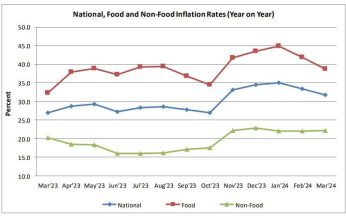Skills development can reverse poverty
Malawi continues to rank poorly on the global map as far as poverty is concerned.
This is the case, however, despite implementation of a myriad of national budgets, billions in donor aid, huge accumulation of public debt, countless of policy documents, just to mention a few.
Today, the country—with an estimated 16 million inhabitants—still faces serious challenges of low infrastructure, low energy capacity of electricity, shortage of medicine in public hospitals, youth unemployment and serious security lapses.

a producing and exporting nation.
Just recently, the Africa Economic Outlook noted that Malawi is one of the countries with weak skills base. The report said weak skills base is one of the key constraints to private sector development and competitiveness on the global map.
All these have manifested themselves in the country’s successive low real economic growth rates. In recent years, Malawi has recorded below six percent growth, a threshold deemed to meaningfully impact on poverty.
But solutions to ending social-economic woes in the country are forthcoming, of course implementation is another topic altogether.
Recently, other proponents said one possible and viable panacea to Malawi’s unrelenting woes is skills development.
President Peter Mutharika is one key proponent who recently said at Mponela in Dowa that technical community colleges can make a real impact on people’s lives and reverse the gears of poverty.
The community colleges concept is one of promises the governing Democratic Progressive Party (DPP) made during the campaign leading to the May 2014 Tripartite General Elections.

A national launch of the community colleges was held in Ngara in Karonga on March 20 this year.
The first phase of the programme, according to Minister of Labour, Youth and Manpower Development Henry Mussa, has seen eleven community colleges been established.
Courses such as tailoring and design, bricklaying, carpentry and joinery, plumbing, and welding and metal fabrication and information communication technology (ICT), have been embedded in the programme.
Under the scheme, a community college will offer academic programmes under the level of certificate, diploma and associate degrees, hence in the process improving skills base for Malawi.
It is envisaged that 28 community colleges will be established throughout the country and later on in all 193 constituencies, according to government plans.
Writing on Afriem website, rural development specialist Tadala Mwale lauds the idea to establish the community colleges, hoping that the programme will offer Malawi a dynamic alternative route to acquire certified education for underprivileged local communities.
“Investing in skills development makes economic sense. Without it, investing in Malawi is less attractive, youth unemployment will overtime lead to increasing tensions and human capacity and potential will be lost. That is why it is right to say community colleges are the only way to go for Malawi,” wrote Mwale.
During a regional launch of the programme two weeks ago in Mponela, Mutharika was passionate about the programme and how he envisions it turning Malawi into a producing country.
Without skills development, Mutharika said Malawi cannot become a producing and exporting nation.
Countries such as Germany, China, India, Japan, Brazil and the like have become producing and export-leading economies because they saw the need for technical, entrepreneurial and vocational education, he said.
Currently, the program me is receiving overwhelming recognition and support from the international community.
For instance, the G20 Development Working Group on Human Resource Development nominated Malawi as a pilot country among only four countries in the world to champion skills development.
“We cannot achieve sustainable poverty eradication if our people cannot have decent jobs. And this programme also empowers communities with the spirit of self-dependency. Creating decent jobs for our people to earn an honest living, dignifies us as a people. But we cannot create and get decent jobs unless we are equipped with relevant skills,” added Mutharika.
For his part, Technical Entrepreneurial and Vocational Education Training Authority (Teveta) senior public relations specialist Lewis Msasa said studies have shown that skills increases one’s chances of being employed.
As such, Msasa said, the skills that the youth will be equipped with at these community colleges will enable them to kick start their own business ventures. In the process they might even employ their fellow youths.
As it stands now, it is imperative for all to depoliticise the programme and never compromise the standards of the colleges.






Bravo HE and your administration for the programme. This will be in line with the Sustainable Development Goals being launched in New York.